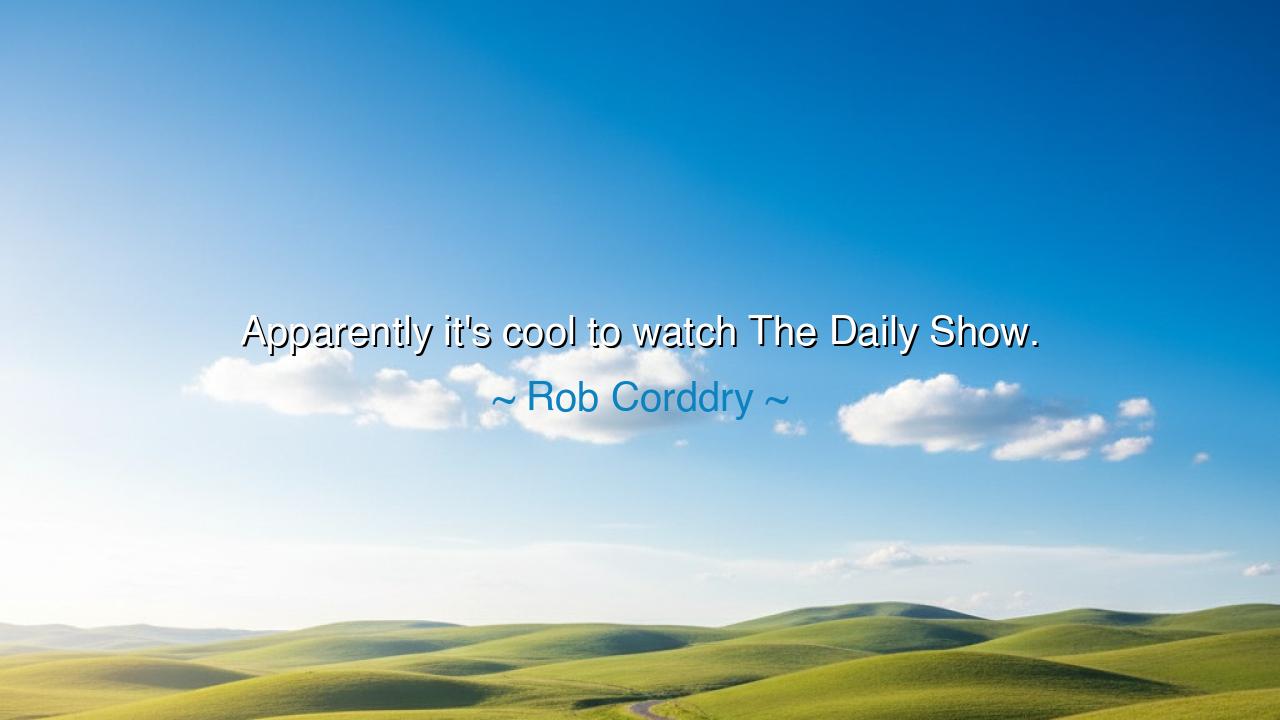
Apparently it's cool to watch The Daily Show.






"Apparently it's cool to watch The Daily Show." These words spoken by Rob Corddry are a reflection on the intersection of media, culture, and society in the modern world. At first glance, it seems like a lighthearted comment, poking fun at the idea that following a particular show or trend can somehow define one's coolness. However, in a deeper sense, Corddry’s quote speaks to the evolving relationship between entertainment and political commentary—how they blend together in a world where humor and information often converge. The “coolness” he refers to is not just about following a trend, but about the shift in how we consume news and culture. The act of watching The Daily Show, for many, becomes a way of participating in the larger discourse of society, blending both comedy and critique.
In the ancient world, humor and entertainment were often intertwined with the social and political fabric of life. The Greeks had their famous satirists—writers like Aristophanes, who used comedy to comment on the political landscape of Athens. His plays, such as Lysistrata and The Clouds, were bold critiques of the leaders and institutions of his time. Aristophanes understood that humor could be a powerful tool for social change, for it allowed people to address uncomfortable truths in a way that was both engaging and accessible. In this sense, Corddry’s remark aligns with the ancient tradition of using humor to comment on the state of the world, using entertainment to speak truth to power, and to offer a mirror to society.
Similarly, Romans like Juvenal used satire to express discontent with the political system. His Satires mocked the moral decay of Roman society and the behavior of its rulers. Juvenal’s sharp wit and cutting observations reminded the people that they had a responsibility to question authority, and that humor was a vehicle through which they could confront uncomfortable truths. The Romans understood that satire, while entertaining, could also provoke thought and stir action. Corddry’s comment about The Daily Show serves as a modern extension of this ancient tradition—using humor not just for laughter, but to illuminate the flaws and contradictions in the world.
In our modern era, The Daily Show is a continuation of this legacy. Through the lens of satirical comedy, shows like these offer sharp critiques of current events, political leaders, and societal norms. Much like Aristophanes and Juvenal, hosts like Jon Stewart and Trevor Noah use comedy to expose the absurdities in politics and culture. They make people laugh, but in doing so, they challenge their audience to think critically about the world around them. In many ways, the popularity of such shows reflects the modern demand for a more accessible and engaging form of political and social discourse, where traditional media may fail to speak directly to younger, more skeptical audiences.
The act of watching The Daily Show, as Corddry humorously points out, has become part of a broader cultural phenomenon. In today’s world, where traditional media is often seen as biased or disconnected from the everyday person, satirical shows offer a fresh perspective. They bring relevant issues to the forefront in a way that is both entertaining and thought-provoking, drawing people into the conversation who might otherwise be indifferent. This shift in how we engage with news—through humor, irony, and satire—reflects the changing nature of how we consume information, particularly in the digital age. Corddry's observation suggests that people, especially younger generations, are drawn to this hybrid form of entertainment that is both enlightening and engaging.
From this, we derive a lesson: that entertainment and humor are not just about escape or triviality—they can be powerful tools for reflection and social commentary. Just as the ancient satirists used comedy to question the status quo, we today can use humor as a means to understand and challenge the society we live in. Laughter, when wielded wisely, can be a tool of change—a way to make difficult conversations more approachable, to provoke thought, and to encourage action. Watching a show like The Daily Show, though entertaining, is a way of engaging in the cultural discourse, using humor as a medium to understand and reflect on the state of the world.
In your own life, ask yourself: how do you engage with the world around you? Are you seeking entertainment that merely distracts you, or are you drawn to that which enlightens and inspires? As Corddry reminds us, the coolness of a show like The Daily Show comes not just from its humor but from its ability to make us think critically about the world we inhabit. Let humor be a tool in your own life, not just for enjoyment but for reflection, for critical thinking, and for change. Laugh, yes—but also question, learn, and grow.






AAdministratorAdministrator
Welcome, honored guests. Please leave a comment, we will respond soon